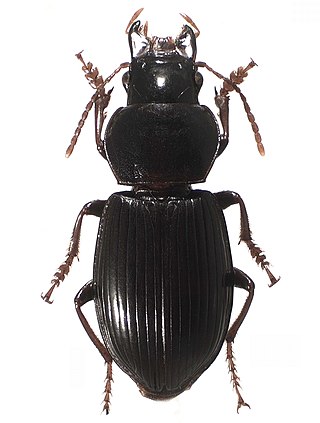
Lilium is a genus of herbaceous flowering plants growing from bulbs, all with large and often prominent flowers. Lilies are a group of flowering plants which are important in culture and literature in much of the world. Most species are native to the Northern Hemisphere and their range is temperate climates and extends into the subtropics. Many other plants have "lily" in their common names, but do not belong to the same genus and are therefore not true lilies. True lilies are known to be highly toxic to cats.

Viktor Schauberger was an Austrian forest caretaker, naturalist, philosopher, inventor and pseudoscientist.
Protognathosaurus is a genus of herbivorous dinosaur from the Middle Jurassic. It was a sauropod found at Dashanpu in Sichuan in what is present-day China.

Abax is a genus of carabid beetles.

Harpalus is a genus of ground beetle first described by Pierre André Latreille in 1802.

Polyozellus is a fungal genus in the family Thelephoraceae, a grouping of mushrooms known collectively as the leathery earthfans. Previously considered a monotypic genus, it now contains the Polyozellus multiplex species complex. The genus name is derived from the Greek poly meaning many, and oz, meaning branch. It is commonly known as the blue chanterelle, the clustered blue chanterelle, bluefan, or, in Alaska, the black chanterelle. The distinctive fruit body of this species comprises blue- to purple-colored clusters of vase- or spoon-shaped caps with veiny wrinkles on the undersurface that run down the length of the stem.

Anisodactylus is a genus of ground beetle native to the Palearctic, the Near East and North Africa.

Ophonus is a ground beetle genus native to the Palearctic, the Near East, the Nearctic and North Africa. It contains the following species in the following subgenera:

Chilotomus is a genus in the ground beetle family Carabidae. There are about eight described species in Chilotomus, found in Asia.

Chydaeus is a genus of beetles in the family Carabidae. Members of this genus are distributed mainly over mountainous regions of southeastern Asia, from the Himalayas and China to the Sunda Islands; however, three species are known from New Guinea and one from Australia.

Gnathaphanus is a genus in the beetle family Carabidae. There are more than 20 described species in Gnathaphanus.

Loxoncus is a genus in the beetle family Carabidae. There are more than 30 described species in Loxoncus.
Oxycentrus is a genus in the beetle family Carabidae. There are more than 60 described species in Oxycentrus.
Proditomus is a genus of ground beetles in the family Carabidae. This genus has a single species, Proditomus mirus.

Pseudognathaphanus is a genus in the beetle family Carabidae. There are about 10 described species in Pseudognathaphanus.
Psychristus is a genus in the ground beetle family Carabidae. There are more than 20 described species in Psychristus, found in south, southeast, and east Asia.

Trichotichnus is a genus of beetles in the family Carabidae.

Morion is a genus of in the beetle family Carabidae. There are more than 40 described species in Morion.
Ophonus gammeli is a species of ground beetle in the subfamily Harpalinae, genus Ophonus, and subgenus Ophonus (Metophonus).
Ophonus xaxarsi is a species of ground beetle in the subfamily Harpalinae, genus Ophonus, and subgenus Ophonus (Metophonus).













